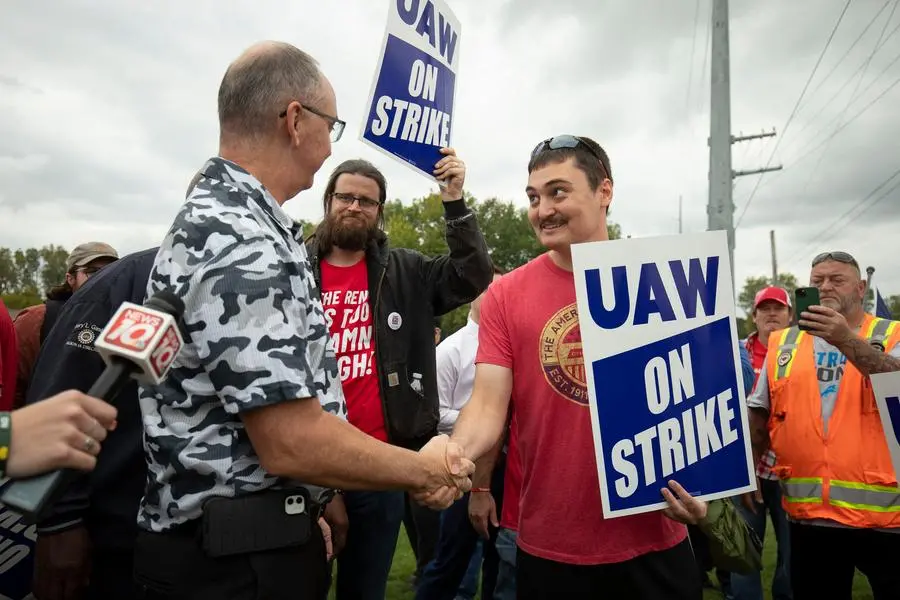PHOTO
Citing last-minute progress in talks, the head of the US auto workers' union said Friday the labor group would maintain its current strike but not expand it to other plants this week.
United Auto Workers President Shawn Fain hailed a "breakthrough" concession from General Motors in response to another threatened expansion of the three-week partial stoppage.
Fain maintained the possibility of escalating the strike further down the road, but did not add any new plants to the target list after announcing prior expansions the last two Fridays following the initial stoppage on September 15.
"Here's the punchline: Our strike is working," Fain said in a webcast update. "But we're not there yet."
Fain said GM has "leapfrogged" Detroit rivals Ford and Stellantis in agreeing "in writing" to include the auto giant's electric battery plants under the UAW's national agreement.
GM has three battery plants under its Ultium Cells joint venture with Korea's LG Energy Solution in the states of Tennessee, Michigan and Ohio, with one of the plants not slated to come on line until 2024, according to Ultium's website.
What the agreement means in terms of how workers at these facilities will be compensated and whether the pay and benefits will match those of conventional jobs was not immediately clear from Fain's statement.
Previously, auto company officials have said they were unable to set terms for the plants because they are joint ventures and not solely under the purview of the Detroit auto giants.
Following Fain's presentation, a UAW press release was headlined, "UAW wins just transition at General Motors."
Fain said GM's shift addresses the worry that that the transition to electric vehicles (EV) will lead to the replacement of high-paid conventional auto jobs with lower-paid EV posts in what the labor leader has called a "race to the bottom."
GM's statement did not directly comment on the EV battery facilities.
"Negotiations remain ongoing, and we will continue to work towards finding solutions to address outstanding issues," GM said. "Our goal remains to reach an agreement that rewards our employees and allows GM to be successful into the future."
Labor relations expert Harry Katz characterized the EV concession from GM as significant given that much of the EV supply chain is not unionized.
"There are positive signs that this will settle in the not too distant future," said Katz, a professor at Cornell's School of Industrial and Labor Relations.
Fain plans to attend a rally at Ford's Chicago plant, along with other labor leaders and Chicago Mayor Brandon Johnson.
- 'Outsmart' corporate America -
Wearing a t-shirt with the slogan "Eat the Rich," Fain reviewed the state of play, with each of the companies in many cases offering slightly different response to key union demands.
Fain said the union is being "strategic" in using the threat of more stoppages to win a better contract.
"Our goal is not to just get mad and shut it all down... but to outsmart and out-organize corporate America," he said.
The UAW launched a targeted strike on September 15 on the Detroit Three, calling for stoppages at a handful of plants, while leaving most of the union's 146,000 US hourly auto workers on the job.
With dual earlier expansions of the strike the prior two Fridays, the total number of workers on strike stands at about 25,000.
Friday's pause in escalation will be a relief to the three companies, although Fain held out the possibility of ramping up the action further if progress stalls.
Ford said "we remain open" to working with the UAW on future battery plants, which are still under development.
Workers have not yet been hired for the battery plants, but "when they are, they can choose union representation and enter into collective bargaining," Ford said.
Stellantis said it has "good momentum" on reaching a deal.
"We are making progress, but there are gaps that still need to be closed," said a letter from Mark Stewart, chief operating officer of Stellantis North America.





















